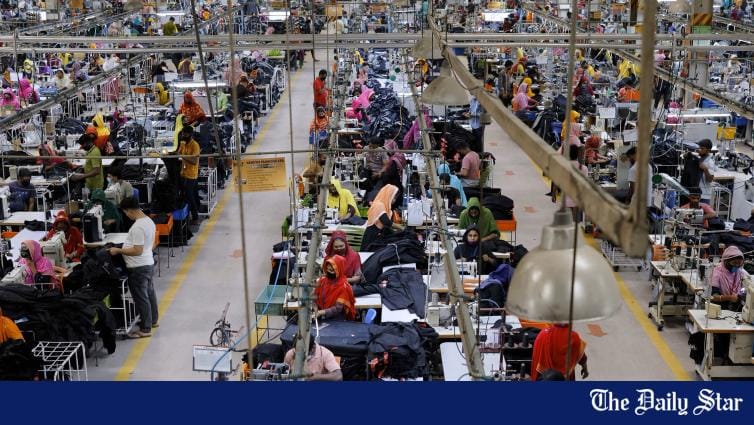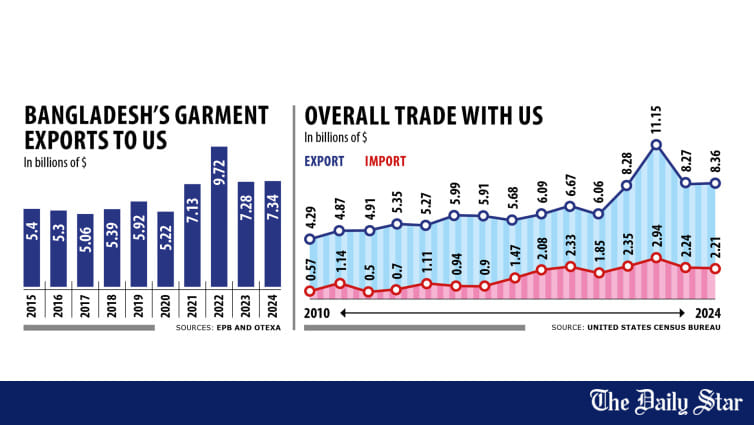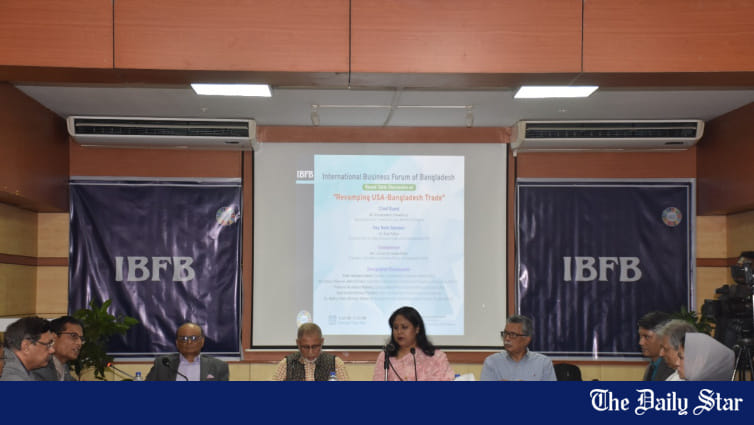Saif
Senior Member
- Jan 24, 2024
- 12,724
- 7,061
- Origin

- Residence

- Axis Group

- Copy to clipboard
- Thread starter
- #97

China to collaborate with BD, EU, others to counter Trump tariff
China wants to address the challenges of the ‘reciprocal tariff’ imposed by the Trump administration in collaboration with other countries, including Bangladesh and the European Union, said Chinese Ambassador in Dhaka Yao Wen on Sunday. Terming the US tariff move ‘a crazy
China to collaborate with BD, EU, others to counter Trump tariff
FE ONLINE REPORT
Published :
Apr 13, 2025 19:20
Updated :
Apr 13, 2025 19:27

China wants to address the challenges of the ‘reciprocal tariff’ imposed by the Trump administration in collaboration with other countries, including Bangladesh and the European Union, said Chinese Ambassador in Dhaka Yao Wen on Sunday.
Terming the US tariff move ‘a crazy’ decision, which jeopardises the international trading order, he said China is looking forward to Bangladesh and others, including the European Union, working together to stop the turmoil and to bring the matter to the right track, to ‘find the right way out’.
“So, let's work together,” the ambassador said while addressing a seminar on ‘Reassessing Sino-Bangla relations: Chief Adviser’s landmark visit’ organised by the China-South Asia Centre for Socio Cultural Studies (CSCSS) of the South Asian Institue of Policy and Governance (SIPG), North South University in the city.
National Security Adviser, and High Representative to the Chief Adviser Khalilur Rahman was the chief guest in the seminar, moderated by Tawfiq M Haque, director of the SIPG.
Referring to the Bangladesh government’s invitation to the Chinese companies for involving in the Teesta River water management project, he said his country has been involved in many game-changing projects in Bangladesh, and now China is ready for the Teesta Project also.
“The relations between Bangladesh and China are not focused on any particular party or government but aim to serve the interests of the people”, the Chinese envoy spelt out.
About the US tariff, he said it has hugely disrupted the current multilateral Free Trade Agreement and is against international law.
But he made it clear China hits back against the US move and imposed increased tariffs against US exports in a similar fashion.
“We'll fight back. We're fighting for free trade. We're fighting for the balance and justice of the world. We're maintaining this current international trade agreement.”
However, he mentioned that China is also for negotiation.
“China is ready if the US wants to talk with us. China will not reject any talk. But talks are possible if they are based on mutual trust. China will not talk to someone. So China will wait and see what the next move taken over by the US."
But until this China continues to fight, not only for themselves but for the world, he said, adding that “We are taking this responsibility”.
Mr Wen emphasised the importance of economic cooperation between Bangladesh and China with a focus on deeper integration and mutual support and described the chief adviser’s visit to China as a milestone, highlighting the political message of mutual support between the two countries.
“The visit is seen as defining the future direction of cooperation, with increased mutual trust and discussions on terror issues. The one China principle is reiterated, opposing independence for Taiwan, and Bangladesh's expected support for China's stance on the issue,” he added.
He noted that the upcoming visit of a delegation from China will focus on educational and healthcare cooperation.
“Next week, the government of Yunnan will visit Bangladesh, and this time they'll do two very important missions for the visit. One is enhanced educational cooperation. The other is on healthcare. So you must be aware that we already opened four hospitals in the province for the treatment of the patients from Bangladesh. The first batch of patients only went there. So, they are encouraged by the treatment provided by these four hospitals. So it is just our first step,” Mr Wen said.
The Chinese delegation’s visit also aims to open more Chinese hospitals in Bangladesh and enhance vocational educational training through collaboration with North South University, he said, adding that Chinese companies plan to establish a regional training centre in Bangladesh to train local labourers for projects in the Middle East and Europe.
FE ONLINE REPORT
Published :
Apr 13, 2025 19:20
Updated :
Apr 13, 2025 19:27
China wants to address the challenges of the ‘reciprocal tariff’ imposed by the Trump administration in collaboration with other countries, including Bangladesh and the European Union, said Chinese Ambassador in Dhaka Yao Wen on Sunday.
Terming the US tariff move ‘a crazy’ decision, which jeopardises the international trading order, he said China is looking forward to Bangladesh and others, including the European Union, working together to stop the turmoil and to bring the matter to the right track, to ‘find the right way out’.
“So, let's work together,” the ambassador said while addressing a seminar on ‘Reassessing Sino-Bangla relations: Chief Adviser’s landmark visit’ organised by the China-South Asia Centre for Socio Cultural Studies (CSCSS) of the South Asian Institue of Policy and Governance (SIPG), North South University in the city.
National Security Adviser, and High Representative to the Chief Adviser Khalilur Rahman was the chief guest in the seminar, moderated by Tawfiq M Haque, director of the SIPG.
Referring to the Bangladesh government’s invitation to the Chinese companies for involving in the Teesta River water management project, he said his country has been involved in many game-changing projects in Bangladesh, and now China is ready for the Teesta Project also.
“The relations between Bangladesh and China are not focused on any particular party or government but aim to serve the interests of the people”, the Chinese envoy spelt out.
About the US tariff, he said it has hugely disrupted the current multilateral Free Trade Agreement and is against international law.
But he made it clear China hits back against the US move and imposed increased tariffs against US exports in a similar fashion.
“We'll fight back. We're fighting for free trade. We're fighting for the balance and justice of the world. We're maintaining this current international trade agreement.”
However, he mentioned that China is also for negotiation.
“China is ready if the US wants to talk with us. China will not reject any talk. But talks are possible if they are based on mutual trust. China will not talk to someone. So China will wait and see what the next move taken over by the US."
But until this China continues to fight, not only for themselves but for the world, he said, adding that “We are taking this responsibility”.
Mr Wen emphasised the importance of economic cooperation between Bangladesh and China with a focus on deeper integration and mutual support and described the chief adviser’s visit to China as a milestone, highlighting the political message of mutual support between the two countries.
“The visit is seen as defining the future direction of cooperation, with increased mutual trust and discussions on terror issues. The one China principle is reiterated, opposing independence for Taiwan, and Bangladesh's expected support for China's stance on the issue,” he added.
He noted that the upcoming visit of a delegation from China will focus on educational and healthcare cooperation.
“Next week, the government of Yunnan will visit Bangladesh, and this time they'll do two very important missions for the visit. One is enhanced educational cooperation. The other is on healthcare. So you must be aware that we already opened four hospitals in the province for the treatment of the patients from Bangladesh. The first batch of patients only went there. So, they are encouraged by the treatment provided by these four hospitals. So it is just our first step,” Mr Wen said.
The Chinese delegation’s visit also aims to open more Chinese hospitals in Bangladesh and enhance vocational educational training through collaboration with North South University, he said, adding that Chinese companies plan to establish a regional training centre in Bangladesh to train local labourers for projects in the Middle East and Europe.













